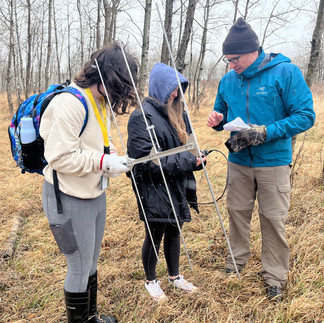Lakeland College Hosts Envirothon
- Vermilion Voice
- May 9, 2024
- 3 min read
Seventy-eight students from 14 high schools across the province travelled to Vermilion May 1–3 to compete in the annual Alberta Envirothon hosted by Lakeland College.
The event began Wednesday evening with an opening ceremony in the Alumni Hall theatre, including a prayer song, living land acknowledgement, and smudge led by Indigenous Elders and Knowledge Keepers. Their involvement reflects the Envirothon organizers’ desire to move toward reconciliation in a good way with the First Peoples of Turtle Island, the land we now call Canada. Throughout the weekend, Elders, Knowledge Keepers, Traditional Knowledge Holders, and Land Guardians were on hand to observe and provide input on how future provincial and international Envirothons can better incorporate Indigenous perspectives and wisdom.
The next morning through the early afternoon, participants took part in classroom and field learning sessions, braving the wind and the snow to learn about aquatic ecology, forestry, soils, wildlife, and the Envirothon’s theme of the year: renewable energy for a sustainable future. The sessions mixed students from different schools, allowing them to work together and get to know each other. Amongst other activities, participants had the opportunity to paint with soils to learn about soil texture and colour, make biodiesel in a lab, and use a clinometer to measure tree height, nurturing the hands-on skills used by environmental and natural resource conservation professionals.
Later that afternoon, students continued preparing the group presentations they had begun working on prior to arriving at the event, which involved responding to a scenario-style question relating to this year’s theme. Each school had 5–6 students ranging from grades 9–12 comprising a team.
In the evening, students presented their scenarios to a panel of judges. This oral presentation was worth up to 200 points. The three top-placing teams then presented again, this time to the entire Envirothon crowd.
On the final day of the event, students were tested on each of the five environmental topics, earning up to 100 points per test for a total of 500 possible points. Students within each team divvied up the topics, with one person per team taking on the responsibility of being tested for one topic.
The winning team, from St. John Paul II High School in Grande Prairie, was awarded the opportunity to attend the National Conservation Foundation’s (NCF) international Envirothon for free in Geneva, New York in July alongside participants from across Canada, the United States, Singapore, and China. The team also received a $1,000 cash prize, generously donated by West Fraser.
The Envirothon dates back to 1979 when the Pennsylvania Soil and Water Conservation Districts created an “Environmental Olympics” to help foster high school students’ interest in natural resource conservation and environmental careers. The event later became known as the “Enviro-Olympics,” and was first known as the “Envirothon” in 1988, when it expanded to become a national event. A team from Nova Scotia was the first Canadian team to participate in the event in 1992. Alberta’s first Envirothon ran in 1997. The province’s highest national ranking was 13th in 2013, and Alberta Envirothon organizers and participants are eager to see that record broken.
Mapy, a student from St. Albert Catholic High School whose team won the Alberta Envirothon last year and competed at internationals in New Brunswick last summer, said, “It gives us an opportunity to experience different possibilities with the environment.” Her teacher and Envirothon coach, Neil Korotash, enthusiastically said, “I could talk this thing up all day.” He shared how several of his former students who were exposed to environmental fields through previous Envirothons later went on to complete degrees in forestry and soil sciences, providing testimony to the impact this event has on learners.
Throughout the weekend, organizers remained adamant that this event could not have been possible without the generous donations from conservation district associations and natural resource agencies, as well as the tireless work of volunteers from across the province. The investment, they believe, is worth it: the critical thinking skills and hands-on involvement fostered through this event encourage high-performing, motivated students to create inventive solutions to the critical issues facing our world today, and to pursue the higher education that will help them reach those goals.
















Comments